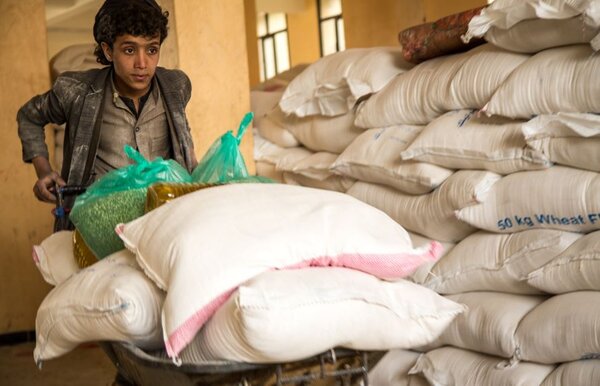WFP gains access to vital wheat stocks needed for Yemen's hungry people

WFP has been appealing to Yemen’s warring sides for access to the mills which contain vital stocks of wheat. The facility lies close to a front line in the strategically located port city.
“Today’s visit to the Red Sea Mills is a crucial step forward but we need sustained access to the mills to begin the process of assessing the stock and moving the viable wheat to the Yemenis who desperately need it,” said WFP Country Director Stephen Anderson. “This visit was the product of long negotiations between both parties facilitated by the UN’s Redeployment Coordination Committee. I thank everyone involved for their commitment to and respect for WFP’s mission to feed Yemen’s hungry.”
At this stage, WFP is unable to confirm how much of the wheat at the mills is still fit for human consumption. WFP needs to carry out a full assessment of the stock before it can begin moving it out and distributing it to hungry people in Yemen.
WFP lost access to the Red Sea Mills when intense fighting broke out in Hodeidah city in early September 2018. At the time, the mills contained 51,000 metric tons or a quarter of the agency’s in-country stock - enough wheat to feed 3.7 million people for one month. Properly stored wheat can last in silos for over a year.
In recent months, WFP has been using other wheat stocks as well as importing grain by sea and overland from Oman to cover the food needs of the population. WFP is currently scaling up to reach 12 million severely food insecure people in Yemen.
WFP and other members of the humanitarian community are attending a major pledging conference in Geneva today to mobilise resources for the crisis in Yemen. Some 20 million people – 70 percent of the population – are struggling to meet their daily food needs. WFP requires US$1.5 billion to ensure uninterrupted food assistance in Yemen throughout 2019.
# # #
The United Nations World Food Programme - saving lives in emergencies and changing lives for millions through sustainable development. WFP works in more than 80 countries around the world, feeding people caught in conflict and disasters, and laying the foundations for a better future.
Follow us on Twitter @wfp_media
Topics
Yemen Refugees and migration Conflicts EmergenciesContact
For more information please contact (email address: firstname.lastname@wfp.org):
Annabel Symington, WFP/Sana’a, Tel. +962 79129 5825
Abeer Etefa, WFP/Cairo, Tel. +202 2528 1730 ext. 2600, Mob. +201066634352
Herve Verhoosel, WFP/Geneva, Mob. +41 79 842 8057
Challiss McDonough, WFP/Washington, Tel. +1-202-653-1149, Mob. +1-202-774-4026
Steve Taravella, WFP/New York, Tel. +1-646-556-6909, Mob. +1-202-770-5993
David Orr, WFP/Rome, Tel. + 39 06 6513 3179, Mob. + 39 340 246 6831
